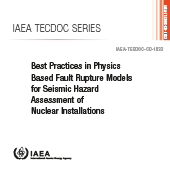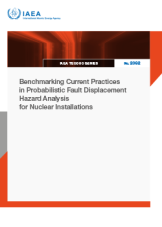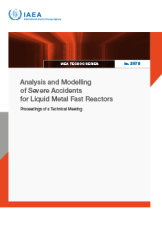Best Practices in Physics Based Fault Rupture Models for Seismic Hazard Assessment of Nuclear Installations
IAEA-TECDOC-CD-1833
ISBN
978-92-0-158917-0
| 287 figures | € 18.00 | Date published: 2018
These proceedings present the outcomes of a workshop convened by the IAEA in 2015. The workshop brought experts together in seismology and earthquake engineering to discuss the applicability of so-called physics based fault rupture models to generate synthetic earthquake ground motion data for meaningful extrapolation of ground motion prediction in areas where there is a lack of sufficient observations. Fault rupture modelling is recommended for estimating strong motion in cases where nearby faults contribute significantly to the seismic hazard for nuclear installations. The overall aspects and process of the modelling and ground motion simulation are described in IAEA Safety Standards Series No. SSG-9, Seismic Hazards in Site Evaluation for Nuclear Installations, published in 2010. However, after the massive earthquake in Japan in 2011, there has been further progress in physics based fault rupture modelling. Therefore, the IAEA arranged this workshop and the publication arising from it. The intention is to provide practical, up-to-date information contributing to effective seismic hazard analysis.
Keywords:
Safety Analysis, Proceedings, Best Practices, Physics-Based Fault Rupture Models, Seismology, Earthquake Engineering, Ground Motion, Seismic Hazard Assessment, Nuclear Installations, Extrapolation



